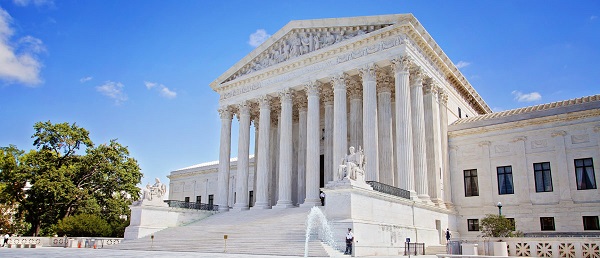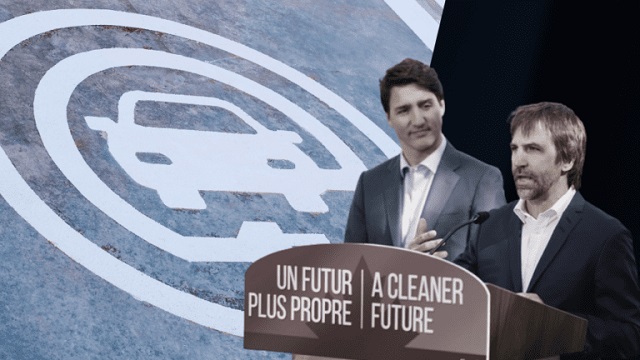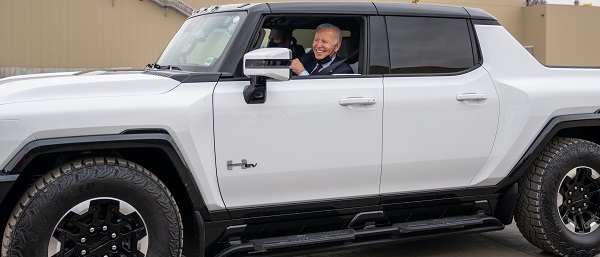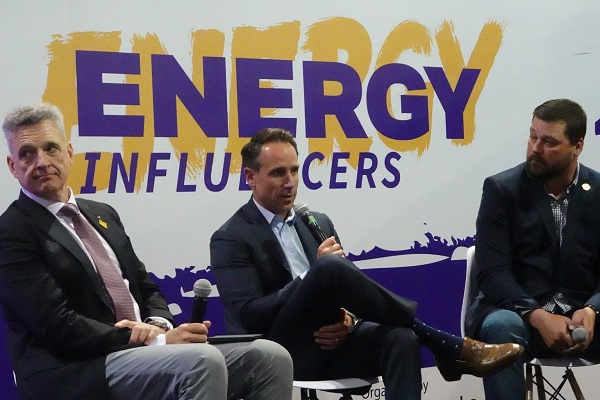Automotive
Supreme Court Delivers Blow To California EV Mandates


From the Daily Caller News Foundation
“The Supreme Court put to rest any question about whether fuel manufacturers have a right to challenge unlawful electric vehicle mandates”
The Supreme Court sided Friday with oil companies seeking to challenge California’s electric vehicle regulations.
In a 7-2 ruling, the court allowed energy producers to continue their lawsuit challenging the Environmental Protection Agency’s decision to approve California regulations that require manufacturing more electric vehicles.
“The government generally may not target a business or industry through stringent and allegedly unlawful regulation, and then evade the resulting lawsuits by claiming that the targets of its regulation should be locked out of court as unaffected bystanders,” Justice Brett Kavanaugh wrote in the majority opinion. “In light of this Court’s precedents and the evidence before the Court of Appeals, the fuel producers established Article III standing to challenge EPA’s approval of the California regulations.”
Kavanaugh noted that “EPA has repeatedly altered its legal position on whether the Clean Air Act authorizes California regulations targeting greenhouse-gas emissions from new motor vehicles” between Presidential administrations.
“This case involves California’s 2012 request for EPA approval of new California regulations,” he wrote. “As relevant here, those regulations generally require automakers (i) to limit average greenhouse-gas emissions across their fleets of new motor vehicles sold in the State and (ii) to manufacture a certain percentage of electric vehicles as part of their vehicle fleets.”
The D.C. Circuit Court of Appeals previously rejected the challenge, finding the producers lacked standing to sue.
“The Supreme Court put to rest any question about whether fuel manufacturers have a right to challenge unlawful electric vehicle mandates,” American Fuel & Petrochemical Manufacturers (AFPM) President and CEO Chet Thompson said in a statement.
“California’s EV mandates are unlawful and bad for our country,” he said. “Congress did not give California special authority to regulate greenhouse gases, mandate electric vehicles or ban new gas car sales—all of which the state has attempted to do through its intentional misreading of statute.”
Automotive
Opposition Conservatives fail in attempt to “Pull the Plug” on Carney’s Electric Vehicle Mandate

From Conservative Party Communications
After a Lost Liberal Decade of rising costs and slow growth, Mark Carney wants you to think his government has moved on from Justin Trudeau’s failed policies.
Unfortunately for Canadians, Carney has no interest in scrapping one of his predecessor’s most reckless and costly ideas: a zero-emissions vehicle (ZEV) mandate starting next year that will ultimately ban Canadians from buying gas-powered cars by 2035.
As the required percentage of ZEV sales increases each year, the government wants to force manufacturers and importers to buy costly credits of up to $20,000 for every EV they are short of the Liberals’ quota – a huge expense that will ultimately be passed on to, and paid by Canadian consumers.
That’s why Conservatives have introduced a motion to end this harmful scheme, ensuring Canadians can continue to buy the kind of car they need at a price they can afford.
EVs are great for many families, who should always be free to purchase the vehicle of their choice. But for many Canadians – who live in cold environments or travel long distances – they can be practically useless, especially without the infrastructure to power them.
One government report estimated that changes to Canadian infrastructure required to support a transition to ZEVs could cost up to $300 billion by 2040. On top of the costs already imposed on manufacturers and buyers, this policy will require billions in new tax dollars and government debt.
No wonder one 2024 survey found two thirds of Canadians find the 2035 target is unrealistic.
As unjust tariffs threaten an automotive sector which contributes billions to our GDP, the Liberals continue to put their elitist, top-down ideology ahead of the livelihoods of hundreds of thousands of proud Canadian workers.
While Carney talks about change, Conservatives are here to deliver. That’s why we’re fighting to repeal the ZEV mandate, scrap the industrial carbon tax and cancel Liberal fuel standards. We trust Canadians – not Ottawa’s Liberal elite – to make the best decisions for themselves and their families.
It’s time to put Canadians back in the driver’s seat.
Automotive
Canada’s EV house of cards is close to collapsing

 By Dan McTeague
By Dan McTeague
Well, Canada’s electric vehicle policies are playing out exactly as I predicted. Which is to say, they’re a disaster.
Back in November, in the immediate aftermath of Donald Trump’s re-election, I wrote in these pages that, whatever else that election might mean for Canada, it would prove big trouble for the Justin Trudeau/Doug Ford EV scam.
The substance of their plot works like so: first, the federal and provincial governments threw mountains of taxpayer dollars in subsidies at automakers so that they’d come to Canada to manufacture EVs. Then Ottawa mandated that Canadians must buy those EVs — exclusively — by the year 2035. That way Ford and Trudeau could pat themselves on the back for “creating jobs,” while EV manufacturers could help themselves to the contents of our wallets twice over.
But the one variable they didn’t account for was a return of Donald Trump to the White House.
Trump had run on a promise to save America from their own back-door EV mandates. Though Kamala Harris had denied that any such mandates existed, they did, and they were founded on two acts of the Biden-Harris administration.
First, they issued an Executive Order setting significantly more onerous tailpipe regulations on all internal combustion engine (ICE) vehicles, with the explicit goal of ensuring that 50 percent of all new vehicles sold in America be electric by 2030.
Second, they granted California a waiver to make those regulations more burdensome still, so that only EVs could realistically be in compliance with them. Since no automaker would want to be locked out of the market of the most populous state, nor could they afford to build one set of cars for California (plus the handful of states which have — idiotically — chosen to align their regulations with California’s) and another set for the rest of the country, they would be forced to increase their manufacture and sale of EVs and decrease their output of ICE vehicles.
Trump’s victory took Canada’s political class completely by surprise, and it threw a spanner into the workings of the Liberals’ plan.
That’s because there just aren’t enough Canadians, or Canadian tax dollars, to make their EV scheme even kinda’ work. Canada’s unique access to the world’s biggest market — America — was a key component of the plan.
After all, vehicles are “the second largest Canadian export by value, at $51 billion in 2023, of which 93 percent was exported to the US,” according to the Canadian Vehicle Manufacturers Association, and “Auto is Ontario’s top export at 28.9 percent of all exports (2023.)”
It further depended on Americans buying more and more EVs every year. But since, when given a choice, most people prefer the cost and convenience of ICE vehicles, this would only work if Americans were pushed into buying EVs, even if in a more roundabout way than they’re being forced on Canadians.
Which is why the plan all began to unravel on January 20, the day of Trump’s inauguration, when he signed Executive Order 14154, “Unleashing American Energy,” which, among other things, rescinded Joe Biden’s pro-EV tailpipe regulations. And it has continued downhill from there.
Just last week, the US Senate voted to repeal the Biden EPA’s waiver for California. Not that that’s the end of the story — in the aftermath of the vote, California governor Gavin Newsom vowed “to fight this unconstitutional attack on California in court.” (Though don’t be surprised if that fight is brief and half-hearted — Newsom has been trying to leave his lifelong leftism behind recently and rebrand as a moderate Democrat in time for his own run at the White House in 2028. Consequently, being saved from his own EV policy might only help his career prospects going forward.)
But it’s worth noting the language used by the Alliance for Automotive Innovation, which represents car companies like Toyota, GM, Volkswagen and Stellantis (several of whom, it should be noted, have received significant subsidies from the Liberal and Ford governments to manufacture EVs), which said in a statement, “The fact is these EV sales mandates were never achievable.”
That’s worth repeating: these EV sales mandates were never achievable!
That’s true in California, and it’s true in Canada as well.
And yet, our political class has refused to accept this reality. Doug Ford actually doubled down on his commitment to heavily subsidizing the EV industry in his recent campaign, saying “I want to make it clear… a re-elected PC government will honour our commitment to invest in the sector,” no matter what Donald Trump does.
Except, as noted above, Donald Trump represents the customers Doug Ford needs!
Meanwhile, our environmentalist-in-chief, Mark Carney, has maintained the Liberal Party’s commitment to the EV mandates, arguing that EVs are essential for his vacuous plan of transforming Canada into a “clean energy superpower.” How exactly? That’s never said.
These are the words of con artists, not men who we should be trusting with the financial wellbeing of our country. Unfortunately, in our recent federal election — and the one in Ontario — this issue was barely discussed, beyond an 11th-hour attempted buzzer-beater from Pierre Poilievre and a feeble talking point from Bonnie Crombie about her concern “that the premier has put all our eggs in the EV basket.”
Meanwhile, 2035 is just around the corner.
So we can’t stop calling attention to this issue. In fact, we’re going to shout about our mindless EV subsidies and mandates from the rooftops until our fellow Canadians wake up to the predicament we’re in. It took some time, but we made them notice the carbon tax (even if the policy change we got from Carbon Tax Carney wasn’t any better.) And we can do it with electric vehicles, too.
Because we don’t have the money, either as a nation or as individuals, to prop this thing up forever.
Dan McTeague is President of Canadians for Affordable Energy.
-

 espionage1 day ago
espionage1 day agoFrom Sidewinder to P.E.I.: Are Canada’s Political Elites Benefiting from Beijing’s Real Estate Reach?
-

 Agriculture1 day ago
Agriculture1 day agoUnstung Heroes: Canada’s Honey Bees are not Disappearing – They’re Thriving
-

 Economy2 days ago
Economy2 days agoOttawa’s muddy energy policy leaves more questions than answers
-

 Daily Caller1 day ago
Daily Caller1 day agoUnanimous Supreme Court Ruling Inspires Hope For Future Energy Project Permitting
-

 Energy1 day ago
Energy1 day agoWho put the energy illiterate in charge?
-

 Alberta2 days ago
Alberta2 days agoUnified message for Ottawa: Premier Danielle Smith and Premier Scott Moe call for change to federal policies
-

 Alberta1 day ago
Alberta1 day agoAlberta’s carbon diet – how to lose megatonnes in just three short decades
-

 Business2 days ago
Business2 days agoCanada’s critical minerals are key to negotiating with Trump






